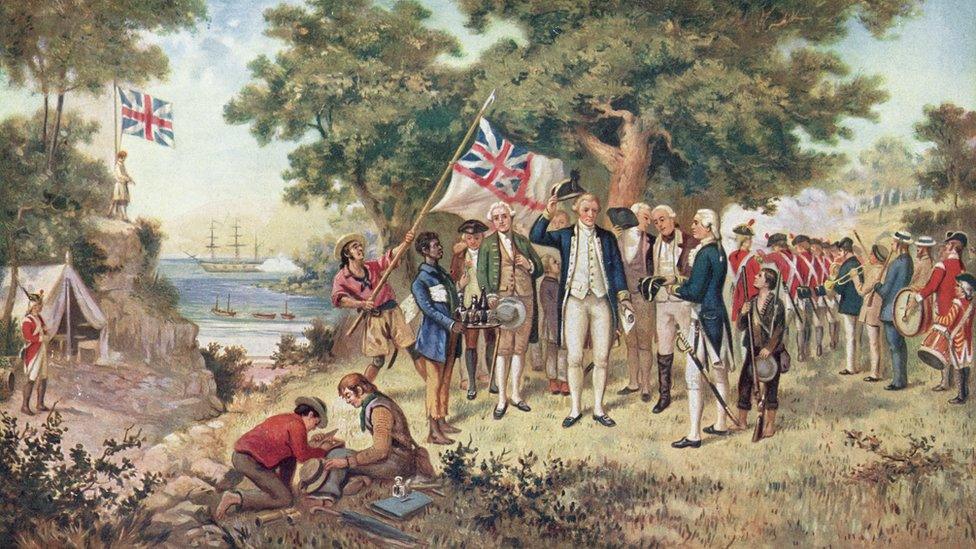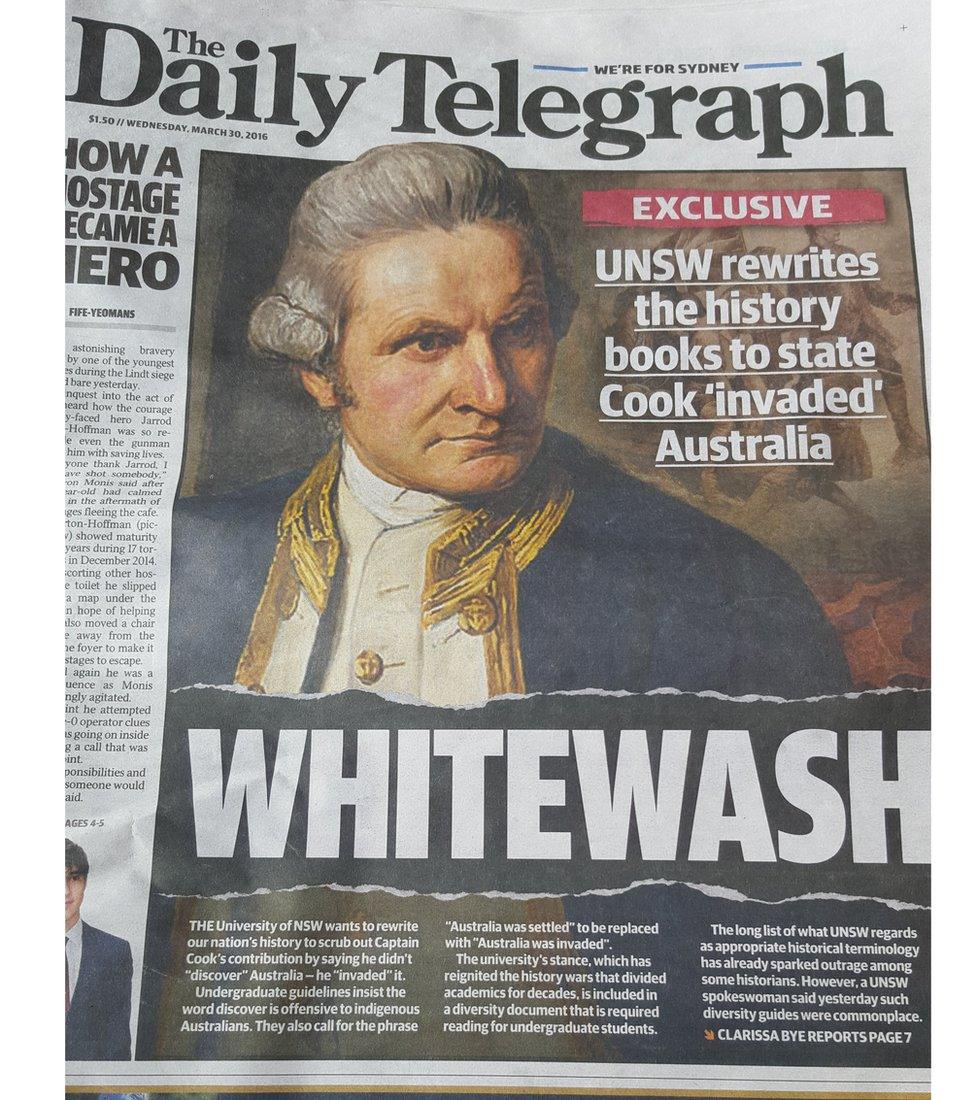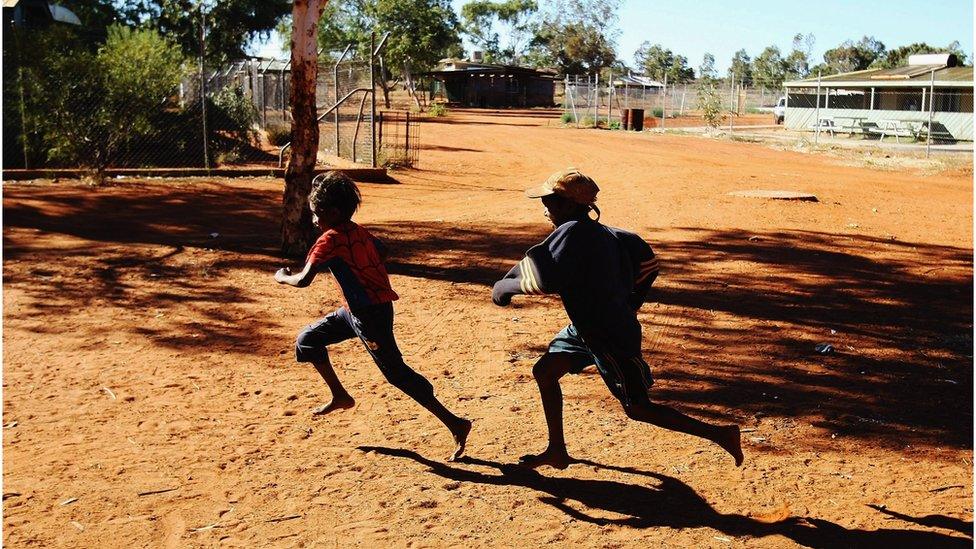Top politician says Australia was invaded
- Published
James Cook commanded HMS Endeavour on his first voyage to Australia and New Zealand from 1769 to 1771
A top politician has backed university guidelines saying students should refer to Britain's "invasion" of Australia.
The University of New South Wales (UNSW) rejected claims on Wednesday it was "whitewashing" its curriculum.
Its Indigenous Terminology guide, external urges students to use the term "invaded" rather than "settled" or "discovered", and to avoid the word "Aborigines".
Queensland state Premier Annastacia Palaszczuk said she supported universities teaching "the truth".
"For many years Australian schools and Australian institutions have not told the truth about the way in which Australia was settled," Premier Palaszczuk said on Wednesday.
"A lot of Indigenous people lost their lives, there were massacres and the truth always must be told."
When the premier was asked if this meant Australia had been invaded, she answered "yes".
Captain James Cook claimed possession of the east coast of what is now Australia on behalf of the British crown in 1770, following more than 160 years of mapping and exploration, mainly by the Dutch.
There were already more than 250 separate language groups of Aboriginal people living on the land.
Then began a process of colonisation and land confiscation which denied Aboriginal rights to land, citizenship and equal status - rights which in many cases were only finally bestowed in recent decades.

A print from a painting showing Captain James Cook (1728 - 1779) taking possession of New South Wales
Language 'not neutral'
The authors of the terminology guide explain their approach at the start, saying that while all staff and students rely heavily upon language, it "is also a vehicle for the expression of discrimination and prejudice... [and] cannot be regarded as a neutral or unproblematic medium".
In what follows, students are instructed to use the terms "Indigenous Australian people" or "Aboriginal peoples" in place of "Aborigines" or "the Aboriginal people", to avoid implying that all Indigenous Australians are the same.
The guide also lists words such as "primitive", "simple", "native" and "prehistoric" as less appropriate than "complex and diverse societies".
Use of a term such as "nomadic" is discouraged on the grounds that it implies Indigenous Australians were not permanently settled, supporting the doctrine of terra nullius that English settlers used to justify occupying land in Australia.
The guidelines sparked outrage in Australia's tabloid Daily Telegraph newspaper and on talkback radio.
Conservative radio host Alan Jones said: "Don't try and restrict the thinking of university students by some so-called diversity toolkit on Indigenous terminology rubbish which dictates game, set and match that Cook's arrival in New South Wales must be referred to as an invasion."
"One student might well argue in favour of invasion and another in favour of settlement. The argument should be judged on its quality. But prejudice and political correctness are anathema to genuine scholarship and learning."

The language guide was described as a "highly controversial rewriting of official Australian history" in some newspapers
Federal Education Minister Simon Birmingham said Australian universities enjoyed "autonomy" around academic concepts.
"Universities should be places where ideas are contested and open to debate, nonetheless, with autonomy comes a responsibility to keep in touch with community expectations and provide an accurate reflection of our history," he said in a statement.
'Stifled by language'
Meanwhile, the University of Queensland says it does not teach that Captain Cook "invaded" nor "settled" Australia.
"Captain Cook was a navigator and explorer... we also teach that the English idea that Captain Cook 'discovered' Australia is inaccurate... [He] was a relative latecomer even in terms of early European visitors to the continent," Professor Jon Willis said in a statement.
"We consider the fact that many Indigenous people in historic and contemporary times think of white settlement as 'invasion'."
Professor Willis said the university does not have an official position on the UNSW terminology guide.
Co-Chairs of the National Congress of Australia's First Peoples, Rod Little and Jackie Huggins, said they were thrilled to see UNSW take the lead on this issue.
"For too long we have been stifled by this age old language," they said in a statement, external to the BBC.
"Modernisation is the key to engaging our younger generations and becoming a more reconciled nation. How do we ensure the wrongs of the past are never repeated when we won't discuss or accept the shame of our history?"
- Published9 February 2016
